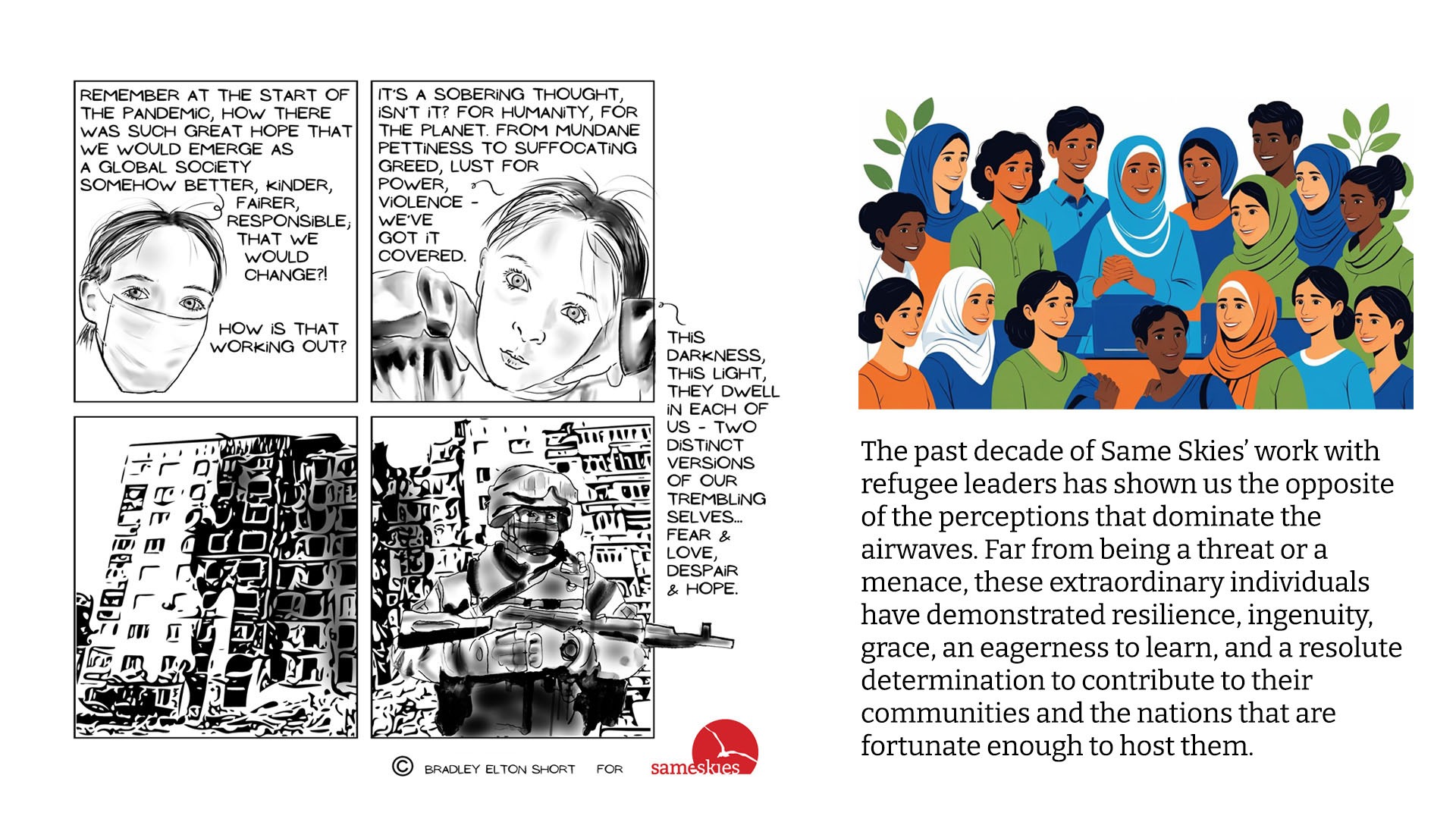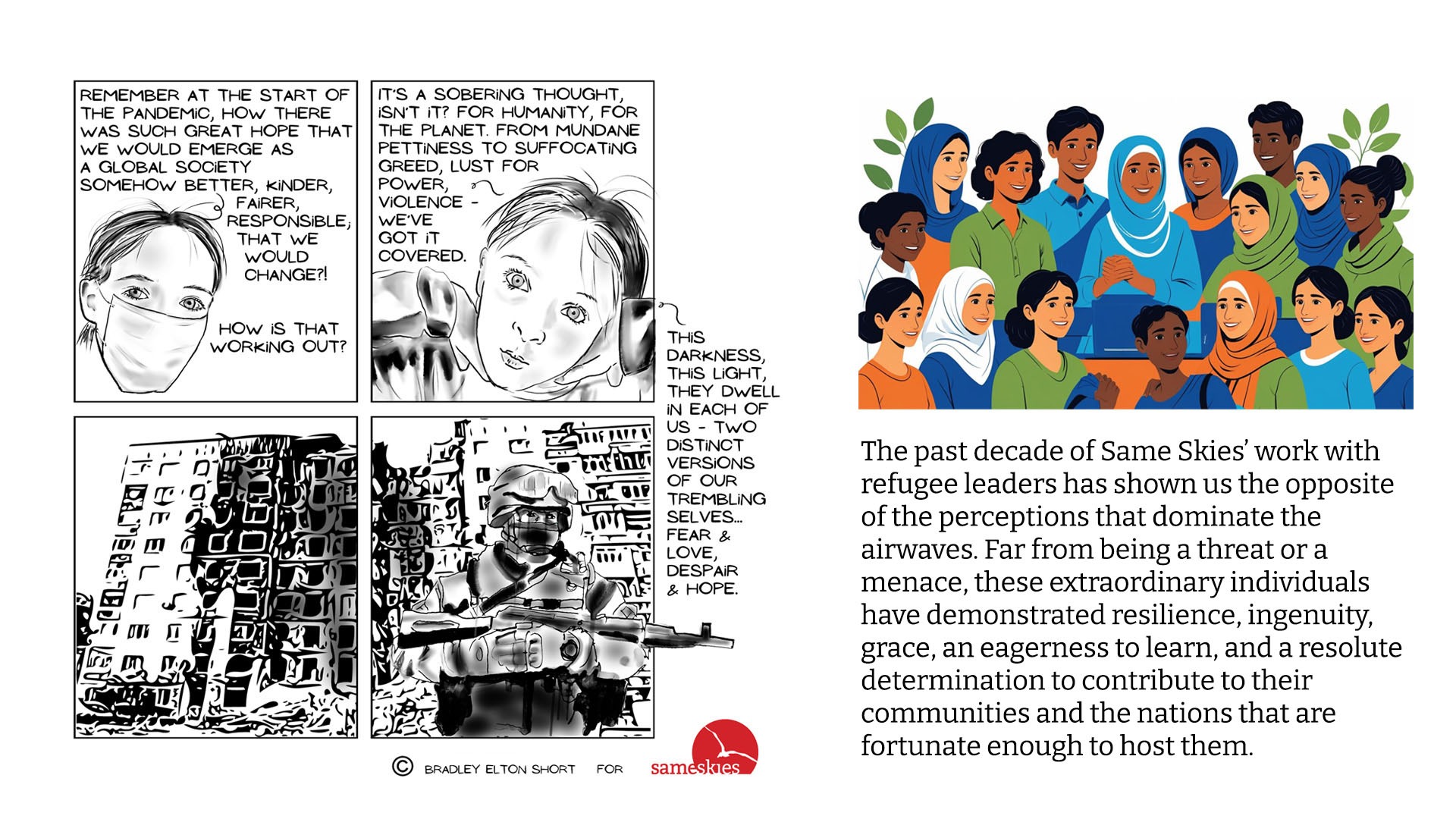A retort in defiance of the polycrisis. Support refugee leaders.
Switzerland
Brad, Julia & Laura founded Same Skies in 2014 after meeting a group of refugee leaders in Indonesia, who wanted to start a learning centre for their own children, who had no access to local schools*.
We believed strongly that there must be better ways than seeing refugees as passive (and helpless) recipients of humanitarian assistance. Our conviction was that people who are going through the refugee experience themselves could (and should be allowed to) help design and provide solutions for their communities – that they could be active agents of change. We decided to listen to what these refugee leaders needed to make change happen, and to try our best to support them.
Same Skies has now been supporting refugee groups in Indonesia and Malaysia for ten years. We have built strong relationships with the leaders of our refugee partners, and the aim of our work always remains the same: to strengthen their leadership and capacities, and the sustainability and independence of their projects so that they can help their communities members claim access to human rights and own decisions that concern their lives.
Laura & Pete (left) and Julia & Brad (right) with Eloise & Ellie
While we have been able to grow our network and jointly gather momentum and support for our cause, the underfunding still remains a constant! Resources never seem to be sufficient, and the community needs only seem to grow…
Same Skies visit to Refugee Learning Nest in Indonesia in May 2024
Same Skies work focuses on:
In plain words, that means that we:
A huge part of our work also focuses on helping our refugee partners overcome structural barriers (due to their lack of identification). This requires quite a bit of out-of-the-box-thinking, innovation and flexibility. Some examples are that we find workarounds to help refugee groups:
Further, we provide funding directly to our refugee partners whenever we can, or we:
Students at Refugee Learning Nest, Indonesia
In recent years, the refugee leaders with whom we work have faced increasing pressure and emotional strain, as the narrative of Southeast Asian host nations as “transit countries” has turned into the one of a “protracted refugee crisis”, and refugees continue to live in limbo for many years. With those developments, exhaustion, depression, anxiety, self-harm, suicide and other acts of desperation and indicators of declining mental health have sparked in our partner refugee communities. As our partners continue their vital community work within precarious circumstances, paying attention to their own wellbeing and collective care is essential.
The urgency of the situation of refugees in Southeast Asia has been exacerbated by the effect of the US administration’s policies on the humanitarian and refugee landscape – on NGOs that had previously been recipients of USAID funding; on refugee groups that have had funding cut from such NGOs as a result; and on individual members of our refugee partner groups, who had been on the brink of resettlement to the USA.
Sewing class at Jakarta Bersatu Project, Indonesia
Neither Indonesia nor Malaysia are signatories to the 1951 United Nations’ Refugee Convention, and hence there is no definition of a refugee or a domestic legal framework to protect their rights. This lack of legal status results in identification issues, and often leads to exclusion from education, health, livelihood opportunities, and access to other basic human rights. In other words, refugees in these countries are not allowed to work, they don’t receive housing or financial assistance, they can’t access public education, they struggle with access to (quality) health care – they are simply left on their own – indefinitely.
Isabel Unwin-Smith
-
$33.00
Funding Goal -
$0.00
Funds Raised -
0
Days to go -
Campaign Never Ends
Campaign End Method
Product Description
Switzerland
Brad, Julia & Laura founded Same Skies in 2014 after meeting a group of refugee leaders in Indonesia, who wanted to start a learning centre for their own children, who had no access to local schools*.
We believed strongly that there must be better ways than seeing refugees as passive (and helpless) recipients of humanitarian assistance. Our conviction was that people who are going through the refugee experience themselves could (and should be allowed to) help design and provide solutions for their communities – that they could be active agents of change. We decided to listen to what these refugee leaders needed to make change happen, and to try our best to support them.
Same Skies has now been supporting refugee groups in Indonesia and Malaysia for ten years. We have built strong relationships with the leaders of our refugee partners, and the aim of our work always remains the same: to strengthen their leadership and capacities, and the sustainability and independence of their projects so that they can help their communities members claim access to human rights and own decisions that concern their lives.
Laura & Pete (left) and Julia & Brad (right) with Eloise & Ellie
While we have been able to grow our network and jointly gather momentum and support for our cause, the underfunding still remains a constant! Resources never seem to be sufficient, and the community needs only seem to grow…
Same Skies visit to Refugee Learning Nest in Indonesia in May 2024
Same Skies work focuses on:
In plain words, that means that we:
A huge part of our work also focuses on helping our refugee partners overcome structural barriers (due to their lack of identification). This requires quite a bit of out-of-the-box-thinking, innovation and flexibility. Some examples are that we find workarounds to help refugee groups:
Further, we provide funding directly to our refugee partners whenever we can, or we:
Students at Refugee Learning Nest, Indonesia
In recent years, the refugee leaders with whom we work have faced increasing pressure and emotional strain, as the narrative of Southeast Asian host nations as “transit countries” has turned into the one of a “protracted refugee crisis”, and refugees continue to live in limbo for many years. With those developments, exhaustion, depression, anxiety, self-harm, suicide and other acts of desperation and indicators of declining mental health have sparked in our partner refugee communities. As our partners continue their vital community work within precarious circumstances, paying attention to their own wellbeing and collective care is essential.
The urgency of the situation of refugees in Southeast Asia has been exacerbated by the effect of the US administration’s policies on the humanitarian and refugee landscape – on NGOs that had previously been recipients of USAID funding; on refugee groups that have had funding cut from such NGOs as a result; and on individual members of our refugee partner groups, who had been on the brink of resettlement to the USA.
Sewing class at Jakarta Bersatu Project, Indonesia
Neither Indonesia nor Malaysia are signatories to the 1951 United Nations’ Refugee Convention, and hence there is no definition of a refugee or a domestic legal framework to protect their rights. This lack of legal status results in identification issues, and often leads to exclusion from education, health, livelihood opportunities, and access to other basic human rights. In other words, refugees in these countries are not allowed to work, they don’t receive housing or financial assistance, they can’t access public education, they struggle with access to (quality) health care – they are simply left on their own – indefinitely.
Isabel Unwin-Smith
| ID | Name | Amount | |
|---|---|---|---|
| 1244 | Listing Agent | [email protected] | |
| 1215 | Listing Agent | [email protected] |








